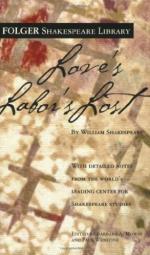|
This section contains 10,795 words (approx. 36 pages at 300 words per page) |

|
SOURCE: "Promises, Promises: Love's Labor's Lost and the End of Shakespearean Comedy," in Criticism, Vol. XXXV, No. 1, Winter, 1993, pp. 41-65.
In the essay below, Chaney reviews scholarly attempts at identifying the genre of Love's Labour's Lost and argues that in this play, Shakespeare purposely avoided a conventionally happy ending.
1. on Subversive Variation and Conventional Variation
The interpretive history of Love's Labor's Lost comprises an exhaustive repertoire of strategies for rescuing the play from the generic implications of its ending. With few exceptions, critics have labored to restore the play to its proper place among the early "happy" or "festive" comedies, as though it stood always in imminent danger of falling from that reassuring category and itself becoming, in effect, a lost labor of love, a failed comedy.1 In this essay I shall dispute, in its several forms, the traditional and persistent "happy" reading of Love's Labor's Lost and...
|
This section contains 10,795 words (approx. 36 pages at 300 words per page) |

|


